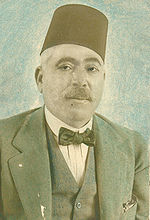- Ahmad Zaki Pasha
-
For other people named Ahmad Zaki, see Ahmad Zaki.
Ahmad Zaki Pasha 
Colorized photograph of Ahmad Zaki Pasha Secretary General of the Egyptian Cabinet In office
1911–1921Prime Minister Muhammad Said Pasha
Hussein Rushdi Pasha
Muhammad Said Pasha
Youssef Wahba Pasha
Muhammad Tawfiq Nasim PashaPersonal details Born 26 May 1867
Alexandria, EgyptDied 5 July 1934 (aged 67)
Giza, EgyptResting place Mosque of Ahmad Zaki Pasha, Giza Nationality Egyptian Spouse(s) Galila Tusun (d. 1939) Children Aleya (1913 – 2000) Residence Bayt al-'Uruba, Giza Alma mater School of Administration Occupation Philologist
Scholar
TranslatorProfession Civil servant Religion Sunni Islam Ahmad Zaki Pasha (Arabic: أحمد زكي باشا) (26 May 1867 – 5 July 1934) was an Egyptian philologist, sometimes called the Dean of Arabism (Arabic: شيخ العروبة), and longtime secretary of the Egyptian Cabinet.
Contents
Civil service
Born in Alexandria to a Kurdish mother and a Moroccan father, Ahmad attended Cairo's Qurabiyya and Tajhiziyya Schools, followed by the School of Administration. While a student there, he won a competition to become a translator for Ismailia's provincial government at a monthly salary of £E 13; in 1888, thanks to his command of French, he moved to the press bureau of the Interior Ministry. He also became an editor and translator for al-Waqa'i`al-Masriya, a translation teacher for the Khedivial School, and an Arabic teacher for the French Archaeological Institute in Cairo, all in 1888. In the following year he won a competition for the post of translator for the Cabinet, for which he became adjunct secretary in 1897 and secretary-general in 1911, serving until he retired in 1921. During World War I he also recodified Egypt's administrative procedures in keeping with its status as a British protectorate.
Scholarly activities
Because of his wide range of interests and numerous publications, he became a fellow of the Institut d'Égypte,[1] the Royal Geographical Society, and the Royal Asiatic Society in London. He served on the administrative boards of both al-Azhar and the Egyptian University (now named Cairo University), also holding the chair for Islamic civilization in the latter. He took the lead in setting the Arabic-language equivalents of European loanwords, such as sayyara (سيارة) for "automobile," and also alerted the press to the Arabic origins of many Spanish and Portuguese place-names that had been inaccurately transcribed into Arabic. He participated in many conferences of the International Congress of Orientalists and was respected by Europeans for his erudition.
Pan-Arabism
He was a staunch nationalist, Egyptian from his youth, later pan-Arab and even pan-Oriental, becoming one of the founders and first secretary-general of al-Rabita al-Sharqiyya (the Oriental League). His Giza home, Bayt al-'Uruba (Arabic: بيت العروبة), became the meeting place for visitors from other Arab countries, even at times a site for reconciliations between quarreling Arab princes, and a repository of Arab antique furniture, jewelry, books, and manuscripts. He also erected a mosque near his home, where he is buried. A prodigious writer of articles and short books, he did not live long enough to complete what would have been the crowning achievement of his scholarship, an Arabic dictionary modeled on the French Larousse. He gave his books and manuscripts to Dar al-Kutub.
See also
References
- General
- Al Gendi, Anwar (1963) (in Arabic). Aḥmad Zakī al-mulaqqab bi-shaykh al-ʻUrūbah: ḥayātuhu, ārāʼuhu, āthāruh [Ahmad Zaki, a.k.a. the Dean of Arabism: His Life, His Opinions, His Legacy]. Aʻlām al-ʻArab 29. Cairo: Ministry of Culture and National Guidance. OCLC 301365981. http://dar.bibalex.org/#DAR-Search%2F%28Title%3A%28%D8%A3%D8%AD%D9%85%D8%AF%20%D8%B2%D9%83%D9%8A%29%29%20AND%20%28AuthorName%3A%28%D8%A3%D9%86%D9%88%D8%B1%20%D8%A7%D9%84%D8%AC%D9%86%D8%AF%D9%8A%29%29. Retrieved 2009-07-18.
- Goldschmidt, Arthur (2000). Biographical Dictionary of Modern Egypt. Boulder, CO: Lynne Rienner Publishers. pp. 236–237. ISBN 978-1-55587-229-8. OCLC 52401049. http://books.google.com/books?id=p3J6IS8t74QC&lpg=PP1&pg=PA236. Retrieved 2009-07-19.
- Specific
- ^ "Historical Background". L'Institut d'Égypte. Archived from the original on 2004-04-10. http://web.archive.org/web/20040410035512/http://www.isisinternational.net/instutdgpt/history.htm. Retrieved 2009-02-14.
Categories:- 1867 births
- 1934 deaths
- Al-Nahda
- Arab nationalist thinkers
- Arabists
- Book and manuscript collectors
- Egyptian civil servants
- Egyptian Muslims
- Egyptian newspaper editors
- Egyptian pashas
- 19th-century Egyptian people
- Egyptian philologists
- Egyptian scholars
- Egyptian translators
- Egyptian writers
- Fellows of the Royal Asiatic Society
- Fellows of the Royal Geographical Society
- Language teachers
- People from Alexandria
- Egyptian people of Kurdish descent
- Egyptian people of Moroccan descent
Wikimedia Foundation. 2010.
